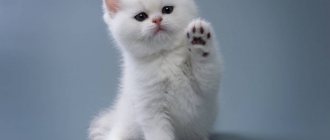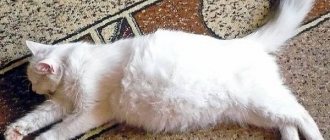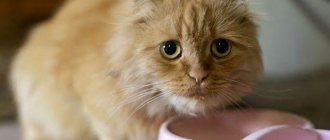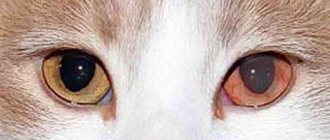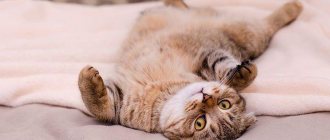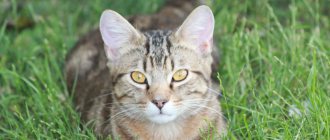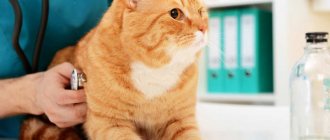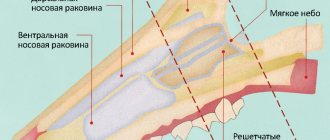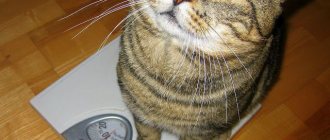10075Pavel
When a cat has a hard stomach, it is necessary to urgently take the animal to a veterinarian. Delay in treatment can lead to the death of your pet. If there is a hard lump in the stomach, then this is also a reason to visit a specialist. The phenomenon may indicate the presence of a tumor or intestinal blockage. Both are extremely dangerous.
Hardness causes tension in the abdominal muscles, which is unnatural. Very often, in addition to this, the cat experiences bloating and other gastrointestinal disorders.
© shutterstock
Why does the kitten have a big belly?
A healthy kitten's belly should be small and soft to palpation. After eating, kittens' tummies become slightly larger. And they decrease after going to the toilet and with a long break between feedings. If the pet's big belly does not subside, the owner should take it to the veterinarian to determine the cause of the bloating.
Some of them do not pose a risk to the pet's health, but others require emergency care.
Worm infestation
Parasites are one of the most common causes of a bloated belly in a small kitten, and he himself remains quite thin. Worms actively multiply in the intestines and stomach. Over time, they need more space, so the animal develops a huge and dense belly.
Newborn kittens usually become infected with helminths through the cat's milk or from other pets that are often outdoors.
The main signs of helminthic infestation:
- vomit;
- constipation, which is replaced by diarrhea;
- itching in the anal area;
- lack of shine in the fur;
- excessive discharge from the eyes;
- weakness;
- decreased or, conversely, increased appetite.
Important! Sometimes you can see dead parasites in your kitten's feces. This suggests that there are a lot of them in the body.
Helminths seriously undermine the baby's health. They injure the intestines and disrupt the functioning of other organs. Parasites can lead to the death of a pet due to intoxication or intestinal rupture.
If you suspect a helminthic infestation, your kitten should be shown to a doctor. He will prescribe the appropriate medications. All people and animals who live in the same house are also recommended to take anthelmintic medicine for prevention.
Constipation
Constipation is another cause of bloating in a kitten. It usually develops due to overeating or feeding food that is too rough to be digested. Causes of constipation:
- stress;
- helminthic infestation;
- pancreatitis;
- ascites;
- dysbiosis.
You can tell if your cat is constipated by the following symptoms:
- The kitten eats a lot, but does not go to the toilet.
- The pet has not defecated for more than 2 days.
- The cat's belly has become swollen, hard, and palpation causes him pain.
- The animal meows pitifully when it tries to relieve itself.
Important! If the kitten does not have stool for more than 3 days, you should immediately consult a doctor. Otherwise, the pet may die due to intoxication of the body.
Overeating and poor diet
Little kittens do not know how to control their appetite, so they always try to eat more. As a result of regularly eating large amounts of food, the stomach stretches and the abdomen begins to bulge. The owner should give food to the kitten in small portions. Otherwise, over time, the cat will develop obesity, which will lead to problems in the gastrointestinal tract and cardiovascular system. As a result, food fermentation begins, and the pet suffers from flatulence, constipation and bloating.
Sometimes a kitten has a bloated belly due to an incorrect diet. This usually happens when the baby is fed the wrong food or cheap prepared foods. Such food is poorly digested in the stomach and causes flatulence and a large belly.
The kitten should not be given:
- cereals;
- raw eggs;
- bread;
- garlic;
- cabbage;
- onion;
- chocolate;
- fruits;
- raw potatoes;
- tomatoes;
- fatty foods.
Owners can independently determine that the cause of a kitten’s hard tummy is increased gas production. To do this, you need to gently tap the abdominal wall with your fingertips. A dull sound means your pet has flatulence. If you put your hand on your stomach, you can feel a rumbling sound.
Ascites (abdominal dropsy)
A swollen abdomen is the main symptom of abdominal dropsy (ascites), which can threaten the cat’s life and requires an urgent visit to the doctor. Associated signs of pathology:
- labored breathing;
- pain when touching the abdomen;
- disruptions in the gastrointestinal tract;
- rumbling in the stomach.
Most often, the development of ascites indicates that your furry pet has diabetes, excess weight, as well as problems with the kidneys, heart or liver.
Important! To diagnose dropsy, you need to lift the kitten up and observe its belly. If it goes down and the baby's figure becomes like a pear, it can be said that the cat has ascites.
Diseases of the liver and pancreas
The reasons why a kitten has a bloated belly are sometimes cirrhosis, hepatitis and other liver diseases. These ailments are accompanied by the following symptoms:
- yellow tint of mucous membranes;
- loss of appetite;
- constantly elevated body temperature;
- stomach ache;
- vomit;
- diarrhea;
- flatulence;
- dark color of urine;
- thirst;
- weight loss;
- weakness;
- convulsions.
Sometimes kittens develop inflammation of the pancreas (pancreatitis). Most often, the disease affects older cats and free-ranging children.
The main signs of pancreatitis:
- decreased appetite;
- nausea;
- diarrhea;
- stomach ache;
- weight loss;
- restless sleep;
- weakness;
- cardiopalmus.
Infectious peritonitis
Infectious peritonitis is life-threatening for a kitten. The main symptom of this pathology is a large and hard belly. In addition, the disease is accompanied by:
- vomit;
- frequent diarrhea;
- weakness;
- increased body temperature;
- decreased appetite;
- weight loss;
- convulsions;
- enlarged lymph nodes;
- fever;
- urinary incontinence.
Important! The likelihood of death from peritonitis in small kittens is very high. If your baby has a swollen belly and there are the signs of illness listed above, you need to go to the vet as soon as possible.
Malignant tumors of the gastrointestinal tract
Oncological diseases usually develop in older individuals. However, recently, cancer is increasingly being discovered in young cats and even newborn kittens.
At the initial stage, oncology does not manifest itself in any way, so if a kitten develops a large belly without other symptoms, it is better to consult a doctor. In later stages, your pet will experience loss of weight and appetite, weakness and apathy.
Other symptoms of gastrointestinal cancer in late stages depend on the location of the tumor. Main signs of stomach cancer:
- abdominal pain when touched;
- constantly elevated temperature;
- hair loss;
- presence of blood in feces.
With intestinal cancer you may notice:
- putrid odor from the mouth;
- frequent constipation and diarrhea;
- flatulence.
What is fat tail
A cat has a fat tail - a medium-sized pouch of skin and fat on the abdomen. It happens in dogs too. Scientifically called the primordial or rudimentary sac.
In long-haired individuals, the fur hides the belly, so the tail is inconspicuous. The short-haired cat and the Sphynx have a pronounced skin formation.
The cat's belly hangs from behind, in the area of its hind legs. The thickness of the fat tail is determined by the fat layer and varies.
Sagging should not exceed 5 cm, otherwise internal pathologies should be suspected.
Domestic cats inherited their fat tails from their wild relatives. In the latter, the sagging of the abdomen is pronounced; the bag sways noticeably when walking and jumping. And in domestic cats, a hanging tummy can be almost invisible. The volume of the fat tail varies by season: in spring and summer the fat layer decreases, in the cold period fat increases.
Reasons for appearance
The exact causes of the appearance of a skin-fat pouch in cats have not been established. Scientific research confirms that functionally the fat tail is an important formation provided for by evolution:
- The stomach of cats is a vulnerable part of the body that is not protected by the skeleton, and abdominal injuries and pathologies are deadly. Scientists believe that the skin bag with a fat layer is a protective formation. Thanks to the fat tail, a cat sneaking during the hunt does not risk scratching or piercing its belly with a sharp branch or stone.
- There is another idea why cats need a primordial sac: it is a storehouse of nutrients. The theory is confirmed by the fact that the fat tail is most noticeable in obese cats, decreases in the summer heat, and increases in the cold season, when the body accumulates fats to prevent winter hunger. In nature, with a prolonged absence of prey, the body begins to consume nutrients from the abdominal pouch.
- The third probable cause of sagging belly is the way cats move. The skeleton of predators is flexible and mobile. During the hunt, the joints of the limbs are stretched, the spinal column bends vertically and horizontally at a significant angle. For freedom of body movements, elasticity and folding of the skin is necessary. The fat tail allows you to bend your spine as much as possible.
- The protective function of the fat tail may be to prevent injury to the abdominal organs during territorial fights with relatives. Cats that are grappling tend to strike hard with their hind paws in the area of the opponent's stomach, tearing the skin with their claws. The fat tail protects the abdominal organs from serious injury.
Diagnosis and treatment
If a kitten has a big belly, you should not put off visiting the veterinarian, because some diseases can lead to the death of the baby. The doctor will conduct a diagnosis, determine the exact cause of the appearance of a large belly and prescribe treatment.
Typically, cats are given a blood test, ultrasound and x-ray. Further treatment will depend on what caused the big belly.
If infected with parasites, the doctor will prescribe special anthelmintic drugs according to the age and weight of the kitten. It must be remembered that some antihelminthic medications can only be taken from 2-3 months.
For constipation, you will have to take petroleum jelly 3 times a day in a dosage of 0.1 ml per 100 g of animal weight, and also do enemas. Massaging the tummy with your thumb in a clockwise direction also gives good results.
Lactobacterin, Hilak Forte or Acipol will help normalize the functioning of the gastrointestinal tract and relieve bloating due to regular overeating or poor nutrition. You will also have to change the food to a better quality one and follow the feeding regime.
In all other cases, the kitten requires immediate surgical intervention to help save its life.
Alarming symptoms requiring urgent contact with a veterinarian
In some cases, the occurrence of this problem requires immediate contact with a veterinarian. It is not recommended to delay a visit to the veterinary clinic if you have the following symptoms:
- excessive salivation;
- repeated diarrhea;
- inability to empty the bowels for a long time;
- false urge to vomit;
- vomiting;
- refusal to drink and eat.
The listed symptoms may indicate dangerous pathological processes in the pet’s body. In some situations, the slightest delay can result in the death of the animal.
Prevention
To avoid bloating and the development of serious diseases, you must follow these recommendations:
- Feed your pet only high-quality food that is suitable for its age.
- Follow your diet and do not increase portion sizes.
- Monitor the cat's weight.
- Introduce complementary foods gradually.
- Provide the kitten with unhindered access to clean drinking water. After all, the less your pet drinks, the greater the likelihood of constipation.
- Make sure your baby goes to the toilet regularly.
- Wash and treat the kitten’s sleeping place and care accessories with disinfectant solutions.
- Periodically arrange fasting days, when the amount of fiber and carbohydrates consumed by the kitten will be minimal.
- Visit your veterinarian twice a year to promptly detect and begin to treat emerging diseases.
- Monitor the quality of the kitten’s coat and the condition of its mucous membranes.
- Every six months, deworm and treat for external parasites.
- Play regularly with your baby to stimulate physical activity.
With proper care and careful monitoring of the kitten's health, it will not be at risk of bloating. If your baby does develop this unpleasant symptom, it is better not to put off a visit to the veterinarian for too long. After all, only a doctor should determine the cause of the appearance of a large belly, so that, if necessary, immediate treatment can be started and, possibly, saving the baby from death.
